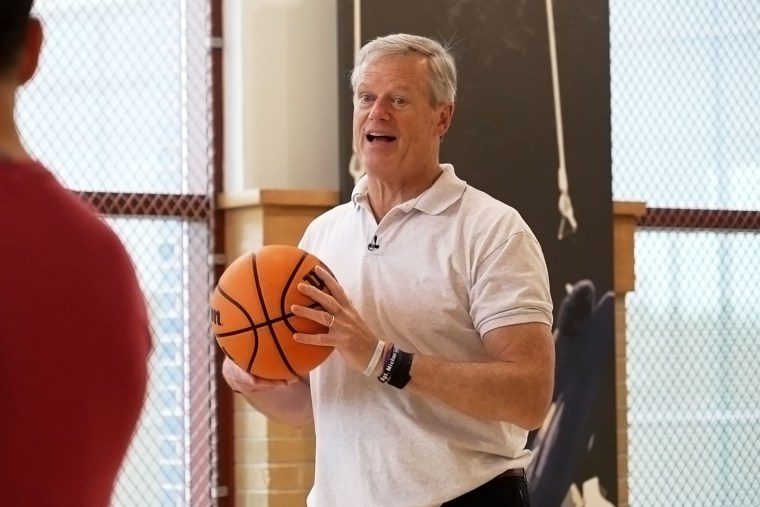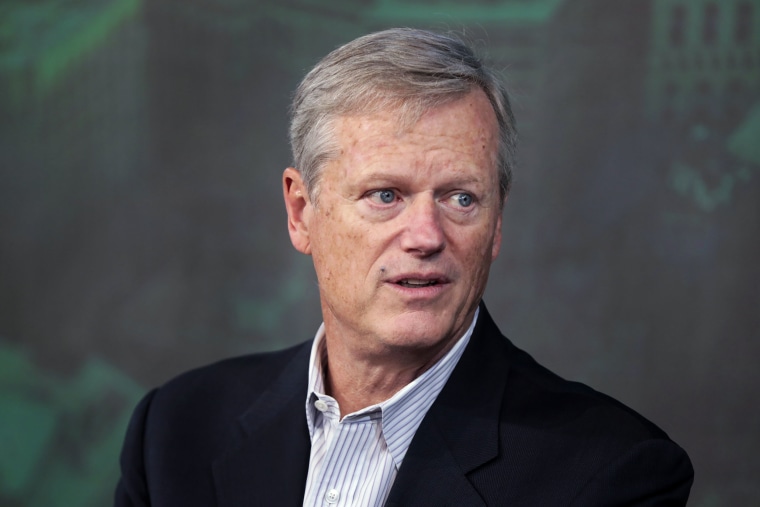INDIANAPOLIS — When Charlie Baker took the NCAA’s top job in January, he knew it would be one of the most volatile periods in the institution’s 117-year history.
But the former Massachusetts governor admits even he was unprepared for the sudden news in August that virtually the entire membership of the Pac-12 would be jumping to other conferences, decimating the most decorated collegiate conference in the nation.
“The speed with which the Pac-12 sort of came apart was an enormous surprise to everybody,” Baker told NBC News in an exclusive interview on the eve of a new college basketball season.
“But I certainly believe we’re going to continue to see realignment within college sports.”
See more from Noah Pransky’s exclusive interview with President Baker — including new NCAA actions related to NIL and sports gambling — on “Hallie Jackson Now,” streaming Monday from 5 p.m. to 7 p.m. ET on NBC News Now.
Baker says the NCAA is preparing for more conference consolidation while trying to figure out how best to mitigate its effects on student-athletes.
Longtime Pac-12 powers UCLA, USC, Washington and Oregon will be joining the Big Ten, home to the most lucrative media rights deal in the country; Colorado, Arizona, Arizona State and Utah are leaving to join the Big 12; while California (Berkeley) and Stanford will be joining the ACC.
Those conferences, along with the SEC — the nation’s other large football conference — will all compete next year with at least 16 teams each.
The Pac-12 will likely enter 2024 with just two teams — Oregon State and Washington State — an obvious challenge for the dozens of athletic teams at those institutions.
“My biggest concern coming out of the gate was trying to figure out how to help Washington State and Oregon State,” Baker said, adding that his other top concern is scheduling.
Baker said the loss of regional conferences will adversely impact student-athletes at all institutions — particularly those in sports with 30 to 70 games a year. Baseball, softball and basketball teams, for example, could all see more contests on the other side of the country.

A report by consultants Bain & Co., commissioned by the NCAA, indicated the trend will continue — both because of the media rights landscape and America’s declining birth rate, which is down 20% since 2007.
College enrollment is also down about 20% since 2010, according to researchers at the Education Data Initiative.
“We’ve got to make sure that student-athletes still have the ability to be students, whatever the alignment looks like,” Baker said. “I hate the fact that the Pac- 12 isn’t going to be with us; at least not in its previous form. But at the same time, if you look at almost any other industry, they’ve been reforming and rejiggering themselves for years.”

Baker said the NCAA’s rejiggering also includes new initiatives that will ensure student-athletes get better health care, expanded mental health services, new scholarship protections, and access to the classroom to complete a degree for up to 10 years after their playing days are over.
The president downplayed speculation around the biggest college football programs — which already conduct a separate championship, outside of the NCAA’s purview — breaking away from the rest of the NCAA. But he stressed an urgent need to “play catch-up” on reforms, possibly writing separate rules for the few dozen programs — out of 1,100 total member institutions — that generate operational profits.
“We need to … figure out how to incorporate big-time college sports and big-time football in with everything else,” Baker said. “It’s paying for all those nonrevenue sports that are about Olympic participation and about the growth in women’s sports. … So we’ve got to figure out what the framework is that makes it possible for everybody to live together.”